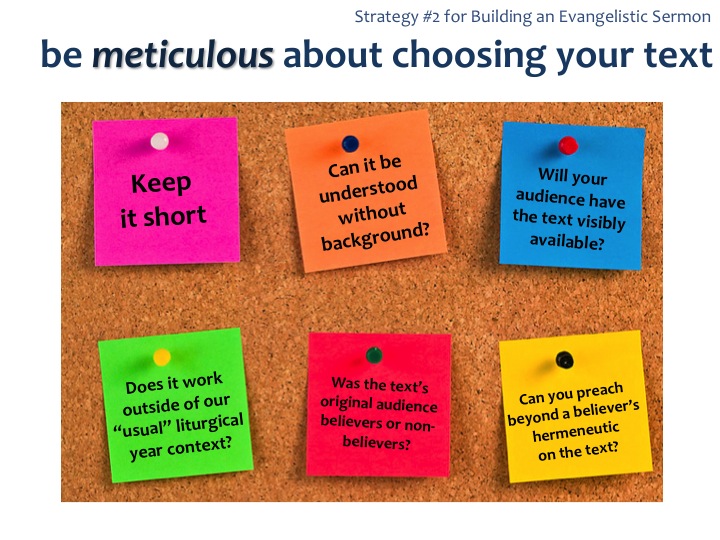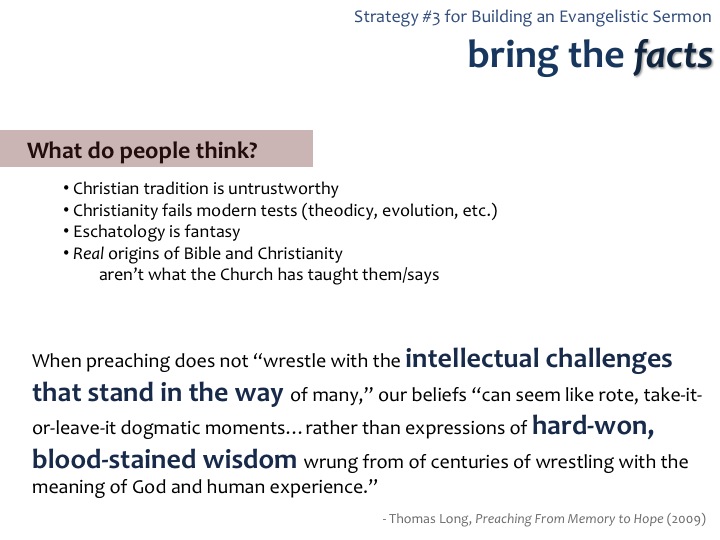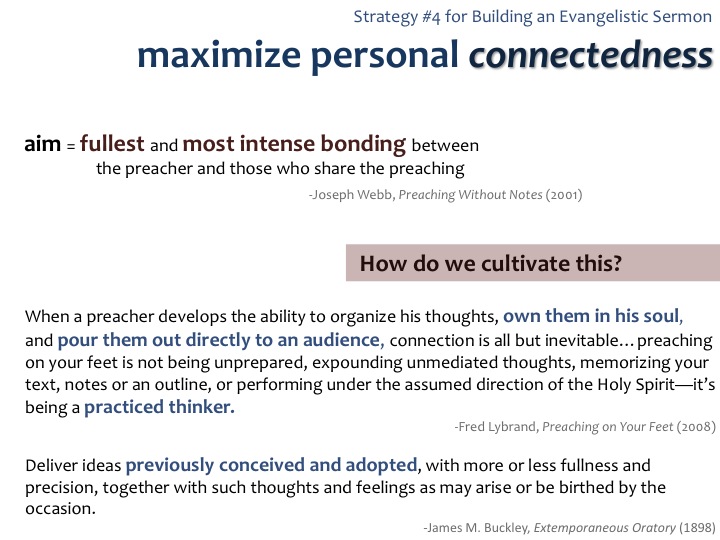This is the eleventh post in a series on evangelistic preaching in Catholic contexts.
We’ve reached the point of discussing how to preach evangelistically in our Catholic context and are discussing specific strategies for developing evangelistic sermons. Here are strategies #2 through #4…
For Catholic preachers, this is a significant difference from a liturgical homily in the context of the Eucharist or the Liturgy of the Hours, where a relatively large portion of Scripture is provided as the basis for preaching and well-crafted integration of diverse texts is encouraged as a fruitful means of reflection for the assembly. When preaching evangelistically, one often has greater choice of text and should carefully consider, if the text can be readily understood without extensive background, if the text is effective with hearers who do not associate it with a particular place in the liturgical year, if the text will be visible to the audience during the sermon, and if a distinctly Catholic hermeneutic is required to grasp the message of the sermon. In many cases, texts for evangelistic sermons will often be much shorter than selections of Scripture used for catechetical or Eucharistic homilies.
Again, this highlights another point of difference in emphasis when comparing evangelistic and Eucharistic preaching. Eucharistic homilies are intended to be essentially connected to Scripture and intrinsically related to doctrine and catechesis (USCCB, Preaching the Mystery of Faith, 23, 31). While this is appropriate for preaching to an audience of faith, hearers of evangelistic sermons often have misperceptions based on faulty factual knowledge of Christian tradition and the Catholic Church. Effective evangelistic sermons will often include a greater proportion of time spent on factual clarification and/or apologetics when compared to other forms of preaching.
In our information and media saturated world, “in which cynicism about what to believe or not believe is everywhere,” what makes preaching unique as a form of communication?[1] One element is the potential for personal connection between a speaker and listener. We cultivate this connection, this “fullest and most intense bonding between the preacher and those who share the preaching,” by offering personal testimony, appropriate intimacy and vulnerability, being relational and interactive, and sharing our fervor, passion, love, and genuine emotion and humor.[2] Many preachers accomplish this through the deliberate minimal use of notes, outlines, or memorization of a script for delivery when preaching evangelistically in order to maximize this connectivity (note: this also helps with simplicity of message!)
————
[1] Joseph M. Webb, Preaching Without Notes, (Nashville, TN: Abingdon Press, 2001), 29.
[2] Webb, Preaching Without Notes, 25.




Love Strategy #4! Those are great quotes. I think that’s one of the things so sorely missing in Catholic homilies. So often the preaching is very generic, removed, and disconnected from the life of the homilist. It’s just expounding facts instead of “poured out.” I think that would go a long way toward homilies being more evangelizing.
LikeLike
Joseph Webb’s book “Preaching Without Notes” really challenged me to change my preaching/inspirational speaking style. In my lay formation program, our preaching class (which included seminarians) was very text centered. Preaching without a written script, and just using an outline was considered pushing it or cutting-edge in terms of connection. But, Webb’s book gave me a whole new perspective on the value of meditating on notes/script thoroughly, but then leaving that behind once you start to speak. I took a leap of faith and attempted his method once for a Morning Prayer sermon–and yeah, it was DIFFERENT. I felt like every moment I was really seeing the gathered assembly, and every moment (for me) felt like I was speaking a prayer aloud (and totally scared and relying on the Holy Spirit). I’m not sure what preaching courses are like for seminarians across the country, but it would be great to see them use a book like Webb’s on occasion to help break the mold a bit.
LikeLike
That sounds fascinating. I’m going to get that book. I’ve experienced the same thing. I used to write out my talks and really script them. I had things I wanted to say and I wanted to make sure I got everything in exactly the way I envisioned it at my desk. But it sometimes got cumbersome and I couldn’t adjust for the time or audience. Then one time when I really knew the material, I ended up going off of the handout I made. It was a loose outline of the talk. It went really well and I felt totally connected to the audience because I was speaking to them from the heart. I ended up leaving some things out that I had prepared to say, but it was fine. I got the message across in an authentic way and I think communicated it better.
LikeLike
[…] Stick to a single passage with a single challenge (54) (here’s more on picking a Scripture passage) […]
LikeLike